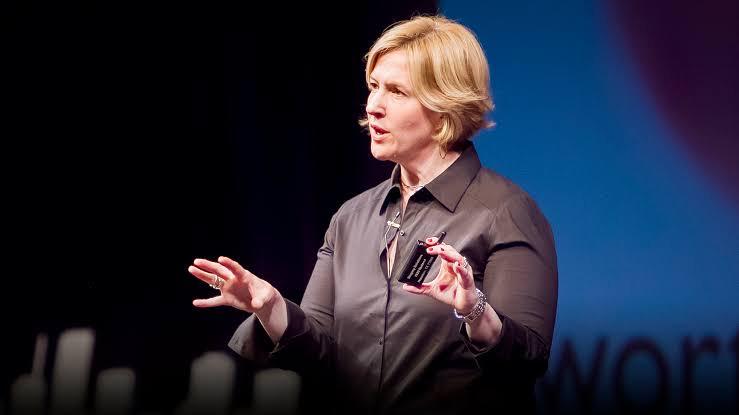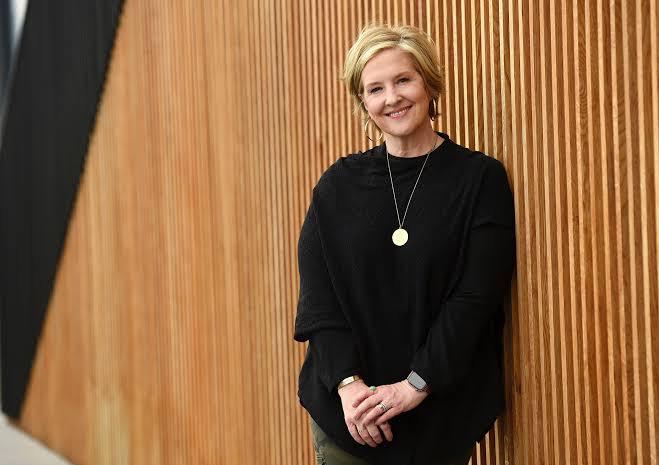Brené Brown is an American professor, lecturer, researcher, six time #1 best selling author, public speaker and podcast host whose work over the past -decade has largely focused on things like courage, vulnerability, shame, and empathy.
In her book Dare to lead, Brown discusses the value of daring leadership in the workplace and how it benefits everyone,how leaders can implement more daring leadership into their management has changed the conversation around leadership in an unexpected and lasting way.
Brené Brown defines a leader as “anyone who takes responsibility for finding potential in people and processes, and who has the courage to develop that potential.”

Introducing daring leadership
To build courage in teams and organizations, daring leaders have to cultivate a culture in which brave work, tough conversations, and whole hearts are the expectation. In other words, courage is how leaders behave and show up in difficult situations, which ultimately strengthens care and connection between leaders and their team members.
As Brown describes, daring leadership is a collection of skill sets that can be taught, observed, and measured by:
- Rumbling with vulnerability
- Braving trust,
- Living into our values, and
- Learning to rise
Rumbling with vulnerability
Brown seeks to reframe what she sees as the myth of the essence of what vulnerability truly is. In many fields across various industries, vulnerability is equated with failure, and workers are rewarded for their efforts to eliminate vulnerabilities every day. As she observes, organizations that have accepted that as the reality are the ones struggling most in terms of being void of daring leadership skills. She says, “many people walk into work every day with one clear task: Engineer the vulnerability and uncertainty out of systems to mitigate risk.”
What Brown advocates for is embracing relational vulnerability between leaders and employees. For work teams, “the behaviors that people need from their group almost always include listening, staying curious, being honest, and keeping confidential information.” She believes this will have a critical role in business as this is the key to building trust within teams.
Braving trust
According to research conducted on behalf of Fortune’s 100 Best Companies to Work For, “trust between managers and employees is the primary defining characteristic of the very best workplaces.” With trust, must-haves such as continuous improvement and sustainable, measurable, and tangible results in the marketing are made possible in organizations. In fact, companies with high levels of trust “beat the average annualized returns of the S&P 500 by a factor of three.”
In the workplace, trust is cultivated by daring leaders through active efforts to respect boundaries, practice reliability and accountability, and come from a place of non-judgment.
How does Brown suggest leaders establish trust-building within teams? It’s through the small moments of care shown by leaders towards their employees: “Trust is earned not through heroic deeds, or even highly visible actions, but through paying attention, listening, and gestures of genuine care and connection.”
Trust is earned by asking your team what they need from you in a way that allows for openness and safety in conversation. By asking questions like, “What does support from me look like?” particularly during times of change, uncertainty, and challenge, leaders can encourage disclosure from employees and improve the quality of the feedback and insights given by team members.
Another way to build trust between leaders and team members is through honesty. The telling of half-truths is usually done to lessen the discomfort of difficult moments in the workplace, such as tough conversations, hard meetings, and altering decision-making. However, this act of protection ends up having the opposite intended effect: “Most of us avoid clarity because we tell ourselves that we’re being kind when what we’re actually doing is being unkind and unfair.”
Distrust in and disconnection from leaders can come with great costs in terms of employee productivity, performance, and engagement: “Leaders must either invest a reasonable amount of time attending to fears and feelings or squander an unreasonable amount of time trying to manage ineffective and unproductive behavior.” As Brown declares, “Clear is kind. Unclear is unkind.”
Living into our values
Brown emphasizes the importance of living into the value of values within organizations: “Living into our values means that we do more than profess our way of being or believing, we practice them. We walk our talk—we are clear about what we believe and hold important, and we take care that our intentions, words, thoughts, and behaviors align with those beliefs.”
Daring leadership involves reminding employees of their purpose and the value they provide through their work, which all starts with working with your team members to establish clarity of values: “Daring leaders sit down with their team members about the unique contributions they make, so that everyone knows where they’re strong.”
A leader’s job is to help “operationalize and translate values from ideals to behaviors—teach people the skills they need to show up in a way that’s aligned with those values and then create a culture in which you hold one another accountable for staying aligned with the values.”
Brown believes when each employee has confidence in their value in the workplace, the company will experience a positive transformation. Team members will coordinate “to each other’s strengths instead of vying to run the whole stretch alone. Once everyone understands their value, they can lean into their gifts.” They will be more willing to lean into the uncomfortable and dare to innovate when driven by their set of beliefs.
Collective courage in an organization is “the absolute best predictor of that organization’s ability to be successful in terms of its culture, to develop leaders, and to meet its mission.”

When it comes to encouraging their people to bring their whole selves to work, daring leaders must set an example through encouraging courage, vulnerability, and failure in the workplace.
Daring leadership will transform the way leaders lead, as “developing a practice of rumbling with vulnerability gives leaders the strength, confidence, and emotional stamina to learn to rise and dare greatly. – https://risepeople.com/blog/daring-leadership-in-the-workplace/
Courage is contagious.
Brown’s research supports the idea that vulnerability is “the emotion that we experience during times of uncertainty, risk and emotional exposure.” Sometimes, people tend to see vulnerability and courage at opposite ends of a spectrum, but Brene defends that one cannot happen without the other. The other interesting component about vulnerability is that trust and vulnerability walk hand in hand. The best leaders understand that they don’t have to wear a protective armor or be perfect to be considered effective or courageous, and they definitely know that perfection is not a building block of trust. Leaders provide psychological safety for their teams to be vulnerable with and in front of each other. Leadership creates a safe space that is an integral part of the work that teams must engage in.
Clear is kind.
Leaders have to have courageous conversations with others. They have to share feedback with others, and leaders determine the tone, words, and emotions that will be used while giving feedback. Brene reminds us that when we give unclear feedback to try to “protect others’ feelings”, we’re really just trying to make ourselves feel more comfortable.

I’ve experienced first-hand how a principal I have worked for has effectively “circled back” to a contentious issue at hand. Brene shares this lesson: “In my research and in my life, I’ve found absolutely no benefit to pushing through a hard conversation unless there’s an urgent, time-sensitive issue at hand.” As leaders, we have to remember that clear feedback is HARD to hear sometimes. As leaders, we can’t own the other person’s emotions. They are going to be mad, hurt, surprised, and more.
“We can’t both serve people and try to control their feelings.”
– Brené Brown, Dare to Lead
Who we are is how we lead.
While it can be very hard to do, it’s important for leaders to connect with our own emotions as well as the emotions of those we lead. Brene describes Armored Leadership vs Daring Leadership, which consists of dichotomies such as “Being a knower and being right vs. Being a learner and getting it right” and “Rewarding exhaustion as a status symbol and attaching productivity to self-worth vs Modeling rest, play, and recovery.”
While fear will always be present when we rumble with vulnerability, our response to fear will determine our success as a leader. –
http://www.thecompellededucator.com/2019/05/leadership-lessons-from-brene-brown.html?m=1
10 of the best leadership quotes from Brené Brown
- “I define a leader as anyone who takes responsibility for finding the potential in people and processes, and who has the courage to develop that potential.”
- “The courage to be vulnerable is not about winning or losing, it’s about the courage to show up when you can’t predict or control the outcome.”
- “Clear is kind. Unclear is unkind.”
- “Daring leaders work to make sure people can be themselves and feel a sense of belonging.”
- “Only when diverse perspectives are included, respected, and valued can we start to get a full picture of the world.”
- “Feeding people half-truths or bullshit to make them feel better (which is almost always about making ourselves feel more comfortable) is unkind.”
- “The only thing I know for sure after all of this research is that if you’re going to dare greatly, you’re going to get your ass kicked at some point. If you choose courage, you will absolutely know failure, disappointment, setback, even heartbreak. That’s why we call it courage. That’s why it’s so rare.”
- “There is an incredibly important, uncomfortable, and brave discussion that every single leader and every organisation in the world should be having about privilege.”
- “It turns out that trust is in fact earned in the smallest of moments. It is earned not through heroic deeds, or even highly visible actions, but through paying attention, listening, and gestures of genuine care and connection.”
- “Leaders must either invest a reasonable amount of time attending to fears and feelings or squander an unreasonable amount of time trying to manage ineffective and unproductive behaviour.”
CITATIONS:
http://www.thecompellededucator.com/2019/05/leadership-lessons-from-brene-brown.html?m=1
